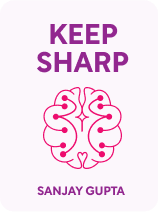

This article is an excerpt from the Shortform book guide to "Keep Sharp" by Sanjay Gupta. Shortform has the world's best summaries and analyses of books you should be reading.
Like this article? Sign up for a free trial here .
What’s the best diet for the brain? What foods should you eat to keep your brain healthy and your mind sharp? What foods should you avoid?
A healthy diet is a vital part of brain health. While there’s no general consensus on the best brain diet, there’s plenty of evidence to suggest that you should eat certain foods regularly and avoid other foods as much as possible.
Learn which foods are good for your brain and which ones can be potentially harmful.
Foods to Eat
Most of the foods that are good for your brain should not come as a surprise. Gupta claims that, although it’s difficult to know exactly how foods interact in our bodies, recent studies point to certain diets as being particularly healthy. For example, the Mediterranean diet is often cited to be the best brain diet. This diet consists largely of olive oil, nuts, fish, and a wide variety of fruits and vegetables.
Of these foods, Gupta mentions that berries and leafy green vegetables are especially good for the brain. One reason for this is that they are high in fiber. Fiber is beneficial because it changes the way your body metabolizes food. If you don’t have enough fiber in your diet, the carbs you consume will be absorbed more quickly, which increases your blood sugar and insulin levels, contributing to cognitive decline. Gupta also points out the benefits of omega-3 fatty acids, which are found in fish, nuts, seeds, and plant-based oils like olive oil. Omega-3 fatty acids are crucial in the maintenance of neurons.
Foods to Avoid
In a typical Western diet, there are three ingredients we consume too much: sugar, salt, and saturated fats. We’ll go through each one and discuss why Gupta feels they are bad for the brain.
Sugar: The average American consumes 163 grams of sugar per day. Most of this usually comes in liquid form or from processed foods. Earlier in the guide, we discussed why high levels of sugar in the blood can be bad for the brain: They can make us insulin resistant, leading to diabetes. They can also lead to high levels of inflammation, which can lead to cognitive decline.
(Shortform note: Insulin resistance can be especially harmful to the brain because of the way the blood-brain barrier works. The brain requires a lot of glucose, so much that the level of glucose in your cerebrospinal fluid (the fluid surrounding your brain) is 60% higher than in your bloodstream. As glucose levels rise, however, the blood-brain barrier can also become resistant to insulin and restrict it from entering the brain. It’s not too much insulin that is the problem here, but too little. Without insulin, brain cells can’t convert glucose into the energy they need to function.)
Salt: Although Gupta doesn’t go into much detail about why salt is bad for you, he does recommend limiting your intake of it as it has been linked to higher levels of heart disease, stroke, and dementia.
(Shortform note: The main reason high sodium diets are harmful is because of the effects on the vascular system, which, as Gupta points out, also harm the brain. Too much salt in the bloodstream leads to high blood pressure. As sodium builds up in the blood, the body dilutes it with water. This leads to a higher volume of blood in the bloodstream, which means more work for the heart and higher blood pressure.)
Saturated Fats: Saturated fats are in foods that are typically solid at room temperature, like cheese, butter, and full-fat yogurt. They can also be found in fatty red meats and milk. Saturated fats raise cholesterol and blood pressure levels and, like salt, have been linked to higher levels of chronic diseases.
(Shortform note: There is much debate surrounding saturated fats in the scientific community. Some researchers suggest that the fight against saturated fats, especially in America, is based on flawed data. The argument against saturated fats comes from a 1952 study that linked them to heart disease. While diets high in saturated fats do seem to raise cholesterol levels, the link to heart disease is now in question. Sugary, carb-rich, and processed foods are now considered to be more harmful when it comes to heart health.)

———End of Preview———
Like what you just read? Read the rest of the world's best book summary and analysis of Sanjay Gupta's "Keep Sharp" at Shortform .
Here's what you'll find in our full Keep Sharp summary :
- The steps you can take to prevent cognitive decline such as Alzheimer’s
- How to keep your brain strong and resilient throughout your life
- Foods to eat and avoid to maintain brain health






